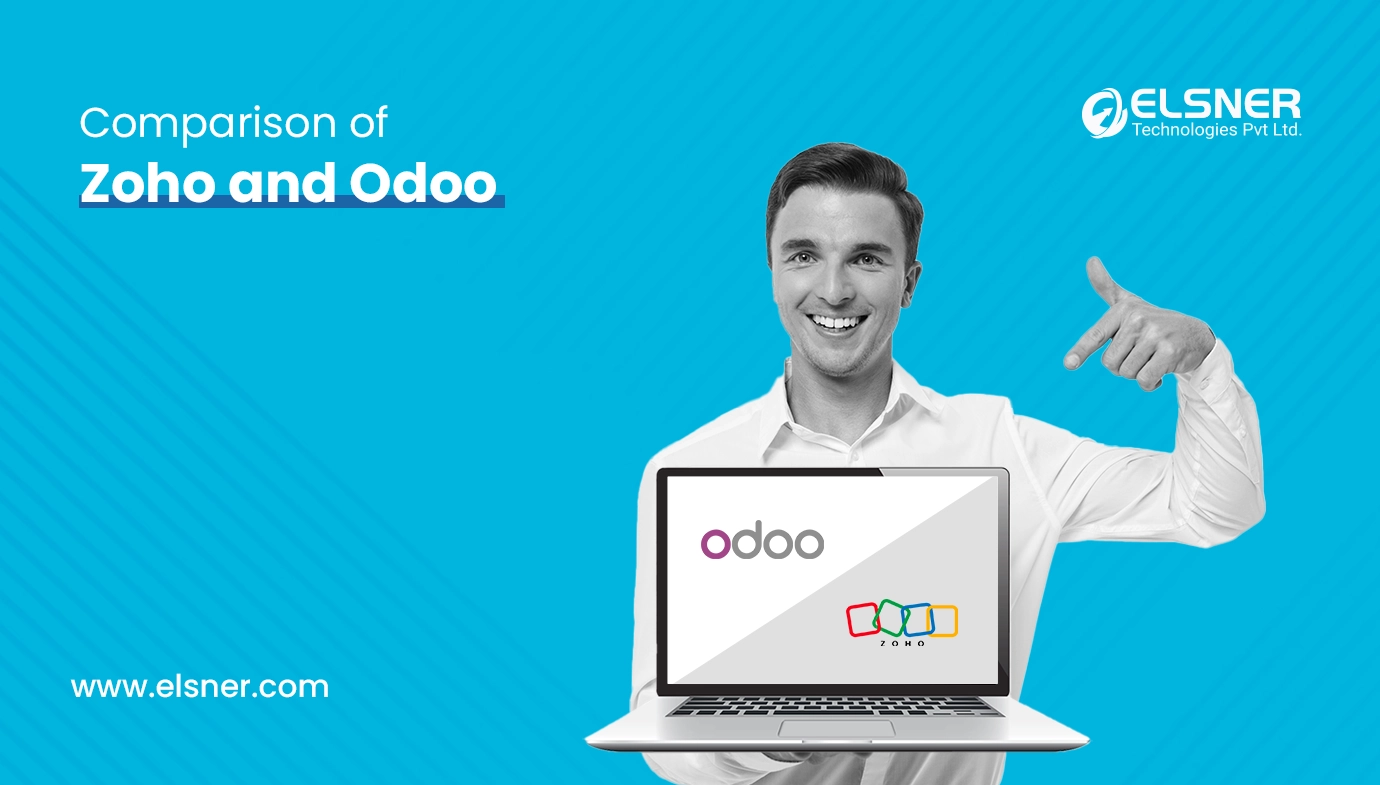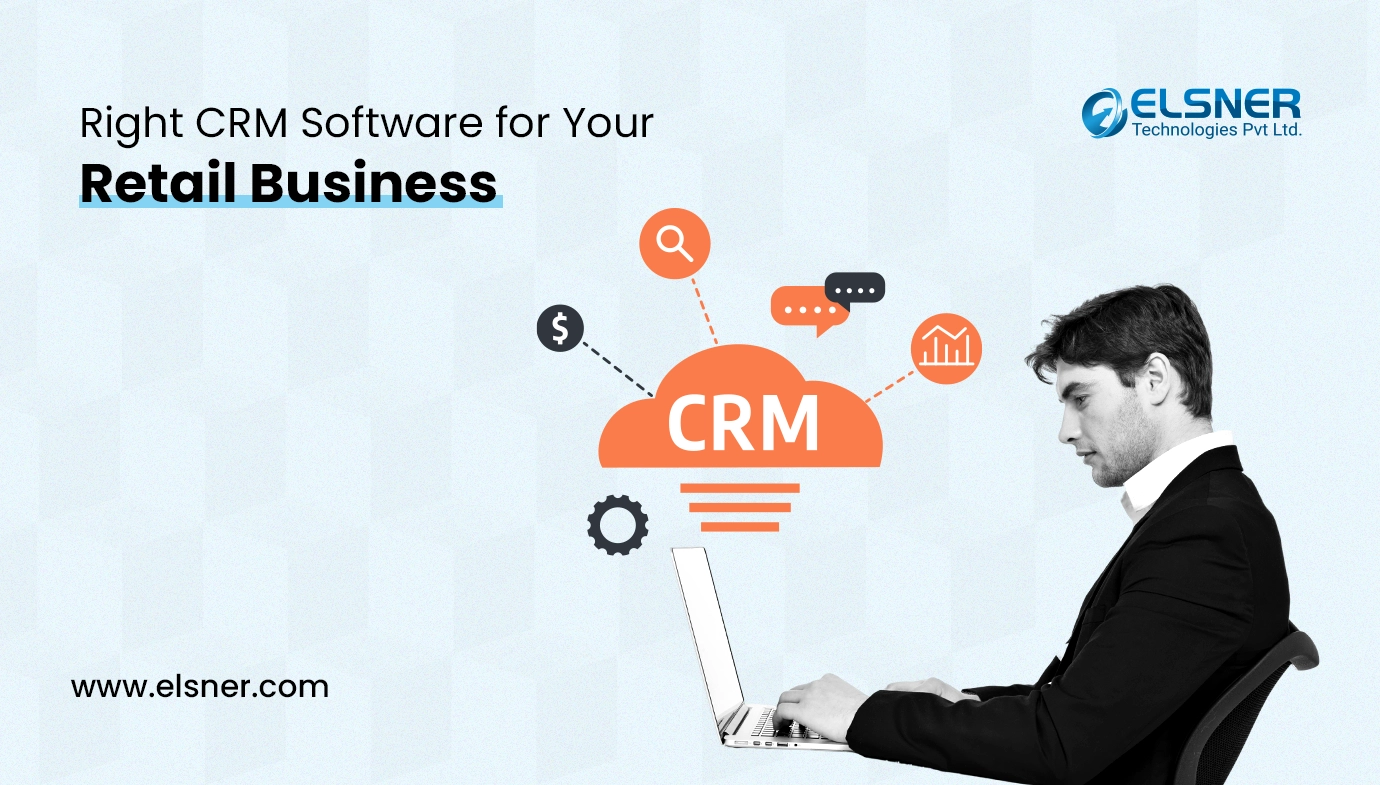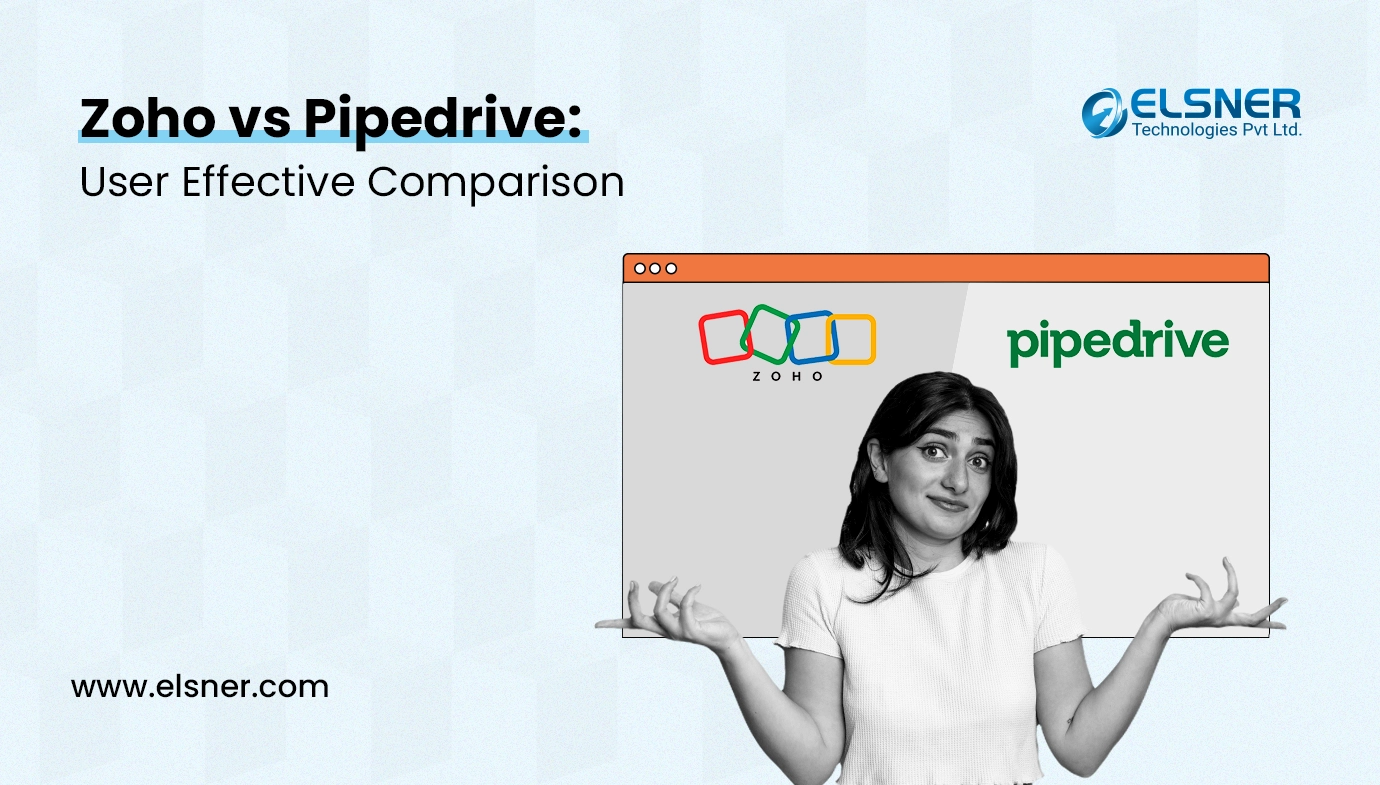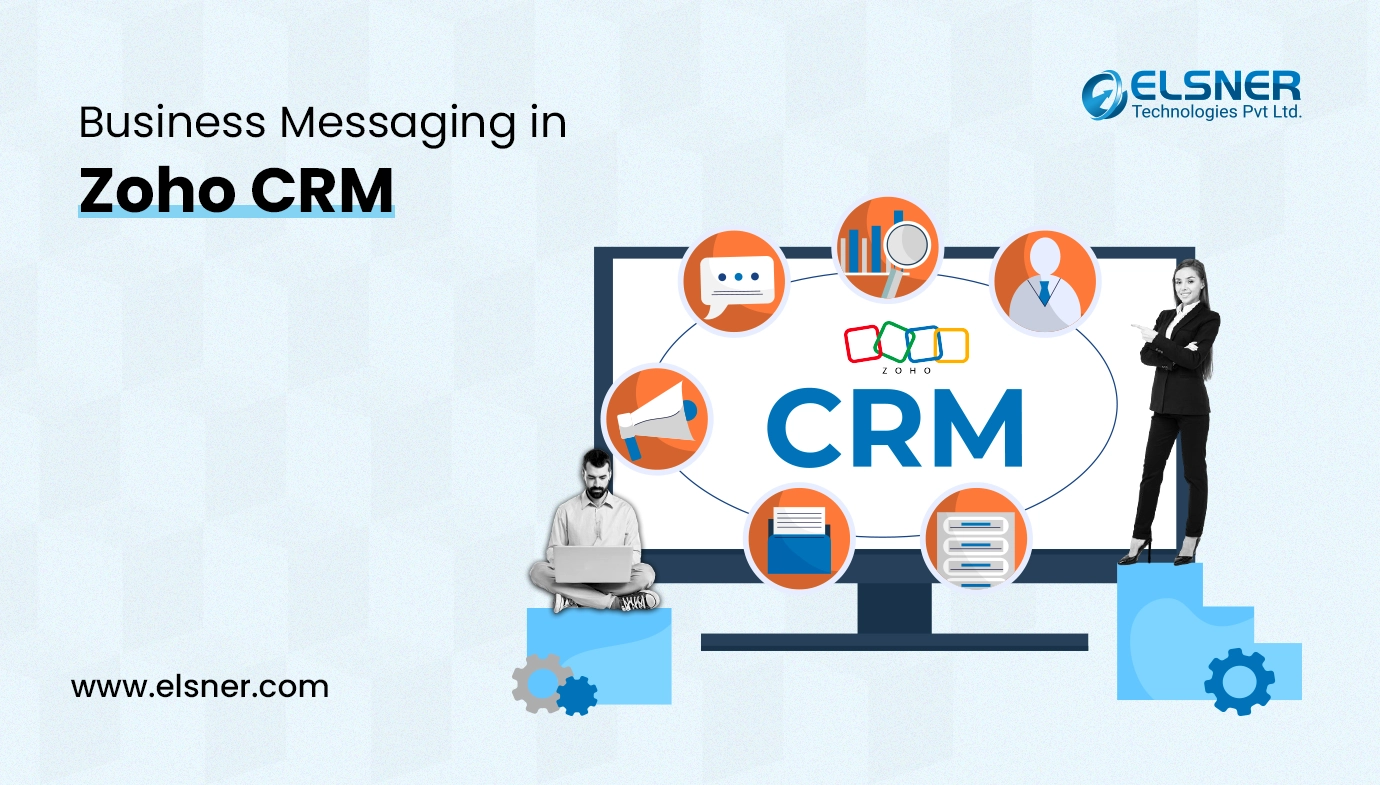- Zoho vs. Odoo: A Comparative Table
- Differences Between Zoho and Odoo: Detailed Discussion
- Pricing
- Apps or Modules
- Integration
- Customer Support
- Scalability
- Implementation Time
- What are the Major Issues with Odoo?
- 1. Complexity in Customization
- 2. Time-Consuming Implementation
- 3. Maintenance and Updates
- 4. Steeper Learning Curve
- 5. Community Support Limitations
- 6. Cost Implications
- 7. Potential for Over-Customization
- When Should You Choose Zoho Over Odoo for Your Business?
- Final Verdict
According to a recent study by Panorama Consulting, 95% of businesses reported improvements in their processes after implementing an ERP system. So, as a business owner, it is high time when you should start thinking about ERP implementation. In this regard, the two most popular options available in the market are Odoo and Zoho. Now, if you are confused between these, then you have arrived at the right blog post.
In this detailed guide, we are going to compare both of these ERPs in detail. So, after reading this guide, you will be able to determine which one is the best fit for your business. Let’s begin:
Zoho vs. Odoo: A Comparative Table
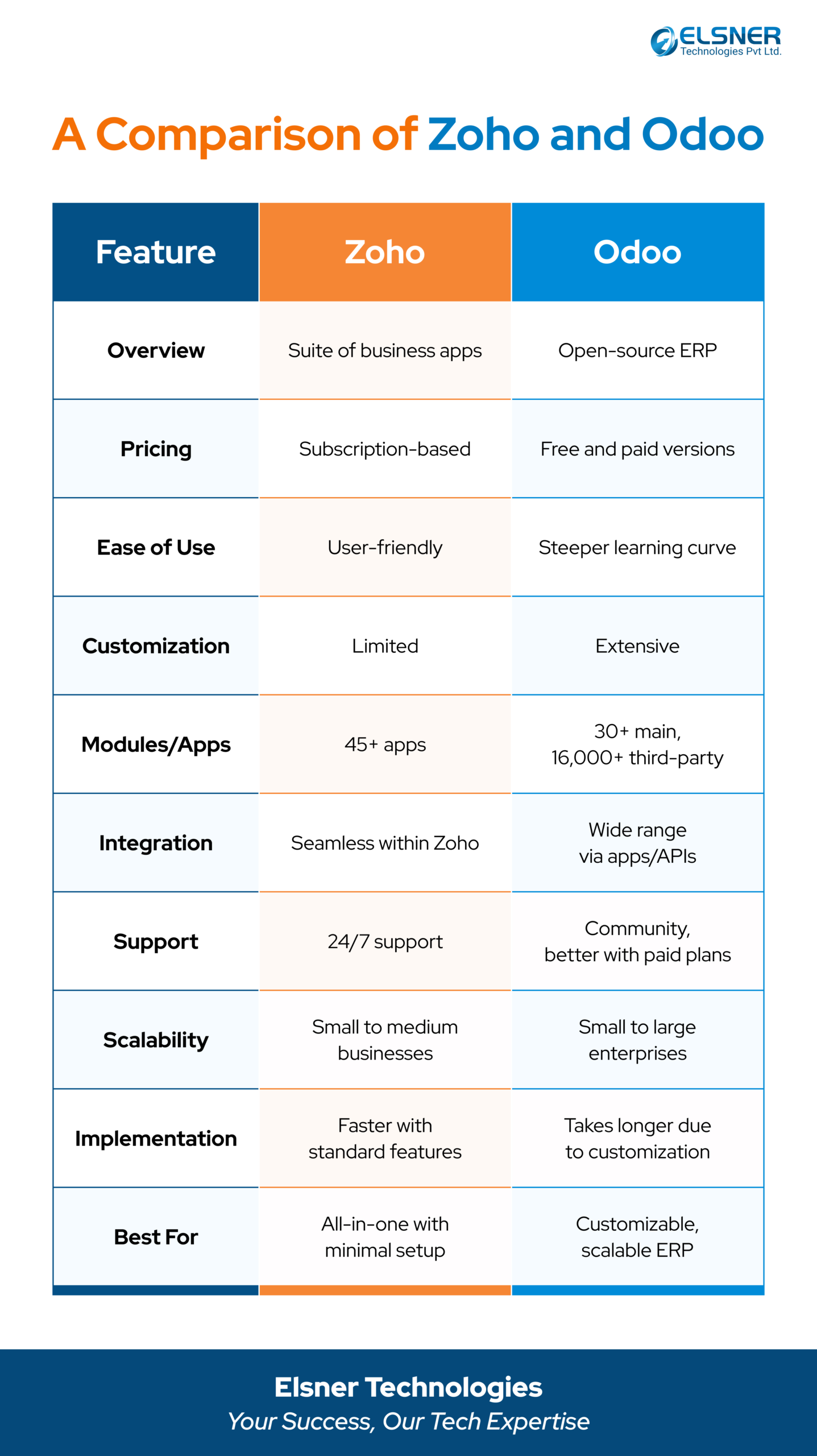
Differences Between Zoho and Odoo: Detailed Discussion
Pricing
Zoho
The subscription-based pricing model of Zoho comes with the availability of different plans. So, it means that businesses of any size can easily access this platform. Its different tiers typically let businesses opt for a plan that well caters to their distinct requirements and budget. It even comes with the option to upgrade as the business grows.
Odoo
Odoo features flexible pricing, including a free community version that provides access to core features. For businesses requiring more advanced functionality and support, Odoo offers paid enterprise plans. This flexibility allows businesses to start with the community version and scale up as needed.
Apps or Modules
Zoho
More than 45 apps are included in Zoho that typically cover different business functions. Some of these are finance, CRM, HR, and project management. So, this extensive range of applications contributes to making Zoho a comprehensive solution for businesses who are looking to streamline their business operations.
Odoo
Odoo provides 30+ main apps and access to over 16,000 third-party apps through its marketplace. This vast selection ensures that businesses can find and implement the exact tools they need. Also, you get the flexibility to add or remove modules in this case with the change in your requirements.
Integration
Zoho
Zoho is known for offering smooth integration within its ecosystem, which lets you employ multiple Zoho applications in tandem without facing any compatibility concerns. This Zoho integration helps ensure seamless data flow and cohesive operation, especially across diverse business functions.
Odoo
Odoo supports a wide range of integrations through its apps and APIs. This flexibility allows businesses to connect Odoo with other software solutions, creating a unified system that encompasses all necessary tools and applications.
Customer Support
Zoho
Zoho is known for offering 24/7 customer support. It comes with extensive documentation, which ensures that users always get the required assistance.
Odoo
Odoo also provides community support for its free version. However, to get more comprehensive support, you will need to choose its paid plans.
Scalability
Zoho
Zoho is suitable for small to medium-sized businesses, with the capability to scale as the business grows. Its comprehensive suite of applications can accommodate increasing demands, making it a viable long-term solution.
Odoo
Odoo is highly scalable, catering to businesses of all sizes, from small startups to large enterprises. Its modular design allows businesses to add or remove applications as needed, ensuring the system can grow and adapt alongside the business.
Implementation Time
Zoho
Zoho typically offers faster implementation times due to its standard features and user-friendly interface. Businesses can quickly set up and start using Zoho applications, minimizing downtime and disruption. Exploring Zoho Success Stories can provide insights into how organizations have effectively utilized Zoho’s solutions to streamline operations and achieve rapid growth.
Odoo
Odoo may require more time to implement due to its extensive customization options. The process of tailoring the system to fit specific business needs can be time-consuming, but the result is a highly customized and efficient ERP solution.
What are the Major Issues with Odoo?
Although Odoo comes with many benefits, there are some of the common concerns that you may have to deal with in this case. Let’s find out:
1. Complexity in Customization
- Extensive customization capabilities can be overwhelming.
- Requires significant technical expertise to tailor the system.
- Small businesses without in-house IT resources may struggle.
- Often necessitates hiring external consultants, increasing costs.
2. Time-Consuming Implementation
- The customization process can be time-intensive.
- Longer implementation times compared to more standardized systems.
- Potential for project delays and increased implementation costs.
3. Maintenance and Updates
- Continuous updates due to the open-source nature.
- Frequent system updates can lead to compatibility issues.
- Requires ongoing investment in maintenance and updates.
- Businesses must stay vigilant about new releases and potential bugs.
4. Steeper Learning Curve
- More complex interface and functionalities.
- Requires more training and onboarding for users.
- Potential productivity loss during the initial phase as users adapt.
5. Community Support Limitations
- The free community version relies on community support, which can be inconsistent.
- Paid support plans are better but can be costly.
- Limited official support for the free version may hinder problem resolution.
6. Cost Implications
- While the community version is free, extensive customization and maintenance can be expensive.
- The cost of external consultants and developers adds up.
- Potential hidden costs in integrating third-party apps and modules.
7. Potential for Over-Customization
- Risk of creating a highly complex system that is difficult to manage.
- Over-customization can lead to inefficiencies and increased operational complexities.
- Balancing between necessary customizations and keeping the system manageable is challenging.
By understanding these major issues, businesses can better prepare and plan for the potential challenges associated with implementing and maintaining an Odoo ERP system.
When Should You Choose Zoho Over Odoo for Your Business?
It all depends on your unique business needs and situations. Let’s discuss this in detail in the following section:
|
Criteria |
Choose Zoho |
Choose Odoo |
| Business Size | Small to medium-sized businesses | Small to large enterprises |
| Budget | Limited budget, cost-sensitive | Flexible budget, willing to invest in customization |
| Ease of Use | Priority on ease of use and quick implementation | Can handle a steeper learning curve for advanced features |
| Customization Needs | Minimal to moderate customization needs | High customization needs |
| Integration Requirements | Primarily within the Zoho ecosystem | Need for extensive third-party integrations |
| Functionality | Basic to advanced business functions | Comprehensive, complex business processes |
| Implementation Time | Need a faster implementation | Willing to invest more time for a tailored setup |
| Technical Expertise | Limited technical expertise | Access to technical expertise for customization |
| Scalability | Moderate scalability | High scalability requirements |
| Customer Support | Requires strong, 24/7 customer support | Can rely on community support or paid support |
| Industry Type | Standard industry requirements | Industry-specific needs, niche markets |
| Growth Stage | Early to the growth stage, looking for quick wins | Established or rapidly growing, need robust systems |
| Data Management | Sufficient with basic data management | Needs robust, unified data flow and analytics |
| Regulatory Compliance | Basic compliance requirements | Complex regulatory compliance requirements |
| Collaboration Tools | Strong need for integrated collaboration tools | Focus on comprehensive ERP and business operations |
| Remote Work Support | Emphasis on cloud-based applications for remote work | Balanced approach with on-premise and cloud options |
Final Verdict
Thus, the choice between Zoho and Odoo ultimately relies on your business’s specific requirements and resources. So, you will be able to make an informed decision when you are clear on these aspects. Both of these platforms tend to provide robust solutions, but their distinct features and capabilities cater to distinct business types. It ensures that you can find the right ERP system to support your growth and success.
“Organizations need to rethink their approach to building a work culture that avoids pushing employees beyond their limits.” Sridhar Vembul, Founder & CEO at Zoho

About Author
Pankaj Sakariya - Delivery Manager
Pankaj is a results-driven professional with a track record of successfully managing high-impact projects. His ability to balance client expectations with operational excellence makes him an invaluable asset. Pankaj is committed to ensuring smooth delivery and exceeding client expectations, with a strong focus on quality and team collaboration.

